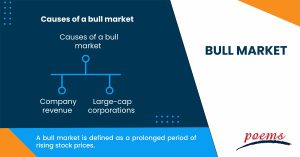Bull Market
Table of Contents
Bull Market
In a bull market, it is ideal for investors to profit from increasing prices by purchasing stocks as early as possible in the trend and then trade them. A bull market typically starts when the broad market index rises by 20% over a minimum of two months.
What is a bull market?
A bull market is defined as a prolonged period of rising stock prices. This typically occurs when investors are optimistic about the future prospects of the market and are willing to pay higher prices for stocks. Bull markets can last for several years and often end with a sharp price decline, known as a market crash.
Understanding bull markets
A bull market is a market on the rise, with rising prices, and investors are confident. This can be contrasted with a bear market, where prices fall, and investors are more cautious. Bull markets typically occur when the economy is strong and growing, and investors are optimistic about the future.
While bull markets can last for a long time, they eventually end. This can happen for various reasons, but typically because the underlying conditions that led to the bull market have changed. For example, if the economy weakens or there is a sudden shock to the system, investors may become more cautious and start selling off their assets. This can lead to a sharp price decline, known as a market crash.
Characteristics of bull markets
There are a few key characteristics of a bull market.
- Firstly, prices are rising across the board, not just in one sector or asset class. This indicates that broad-based buying is happening, and investors are confident in the market overall.
- Additionally, volumes are usually high in a bull market, as more people are trading and investing. This can create a self-reinforcing cycle, as high volumes can attract even more investors.
- Bull markets are typically associated with positive sentiment, as investors are likely to take risks when feeling optimistic.
How to recognise a bullish market?
Here are a few key indicators can help you identify a bull market.
- First, look at the overall trend of the market. If it is consistently rising, that is a sign that it is a bull market.
- Another indicator is the level of investor confidence. If investors are confident and optimistic, that is also a sign that the market is in a bullish phase.
- Finally, look at the level of activity in the market. If there is a lot of buying and selling activity, the market is healthy and in a bull phase
Causes of a bull market

Here are only a handful of the causes of a bull market:
- Economic factors
This market is fueled by favorable economic factors such as strong GDP growth, declining unemployment, low inflation, stable exchange rates, and high industrial productivity.
In nations with fundamentally solid policies in place, together with a proper execution system to assure enough production of products and services, and favorable market circumstances that enable sales, a bull market is common.
- Company revenue
This sort of market is also a result of the company’s increase in revenues and profits. When companies generate larger profits, this fuels a stock market surge as consumer expenditure is rising, and the economy is steady.
- Large-cap corporations
The major benchmark indexes, which are a key indicator of whether the stock market is in a bull or bear market, are mostly made up of large-cap corporations. Small and mid-cap firms are more susceptible to unsystematic changes, which can lead to a deceptive indication of the general market. Rising benchmark index points are the primary indicator of bullish markets since large-cap businesses show considerable improvement.
Frequently Asked Questions
The major difference between a bear and bull market is that a bear market happens when stocks decline steadily over time, whereas a bull market happens when stocks rise. Value stocks are often better investments in bear markets, whereas growth stocks typically perform well in bull markets.
Bull markets often occur when the economy is growing or already strong. They frequently occur with rising business profits, a robust gross domestic product, and a decrease in unemployment.
When it comes to investing in bull markets, there are a few things that you should consider:
- You need to have a clear and defined investment strategy. This will help you stay focused and not get caught up in market hype.
- Secondly, you need to be disciplined with your investing. This means sticking to your investment strategy and not chasing hot stocks.
- You need to have patience. Bull markets can last long, so you must be prepared to hold onto your investments for the long haul.
- Invest in businesses that have a history of expansion. Check the company’s sales, profits, and demand for the commodity it produces.
There are several reasons why bull markets sometimes falter and become bear markets.
- One reason is that bull markets are often driven by irrational exuberance, as investors become caught up in the hype and push prices up to unsustainable levels. Eventually, reality sets in, and prices come back down.
- Another reason is that bull markets are often fueled by easy credit conditions, which can eventually lead to unsustainable levels of debt and inflation. Central banks may tighten monetary policy when this happens, leading to a slowdown in economic activity and a stock market correction.
There are several ways to make a profit in bull markets:
- One way is to invest in stocks that are expected to increase in value.
- Invest in companies that are doing well and are expected to continue to do well in the future.
- Hold long positions in the market. It is just the act of buying a stock or any other security in expectation of an increase in price. To ride the bull market’s rising trend, you would thus go along with security.
- Another way to make money in bull markets is to invest in commodities that are in demand and are expected to continue to be in demand.
- Finally, another way to make money in bull markets is to invest in real estate expected to appreciate.
Related Terms
- Adjusted distributed income
- International securities exchanges
- Margin Requirement
- Pledged Asset
- Stochastic Oscillator
- Prepayment risk
- Homemade leverage
- Prime bank investments
- ESG
- Capitulation
- Shareholder service fees
- Insurable Interest
- Minority Interest
- Passive Investing
- Market cycle
- Adjusted distributed income
- International securities exchanges
- Margin Requirement
- Pledged Asset
- Stochastic Oscillator
- Prepayment risk
- Homemade leverage
- Prime bank investments
- ESG
- Capitulation
- Shareholder service fees
- Insurable Interest
- Minority Interest
- Passive Investing
- Market cycle
- Progressive tax
- Correlation
- NFT
- Carbon credits
- Hyperinflation
- Hostile takeover
- Travel insurance
- Money market
- Dividend investing
- Digital Assets
- Coupon yield
- Counterparty
- Sharpe ratio
- Alpha and beta
- Investment advisory
- Wealth management
- Variable annuity
- Asset management
- Value of Land
- Investment Policy
- Investment Horizon
- Forward Contracts
- Equity Hedging
- Encumbrance
- Money Market Instruments
- Share Market
- Opening price
- Transfer of Shares
- Alternative investments
- Lumpsum
- Derivatives market
- Operating assets
- Hypothecation
- Accumulated dividend
- Assets under management
- Endowment
- Return on investment
- Investments
- Acceleration clause
- Heat maps
- Lock-in period
- Tranches
- Stock Keeping Unit
- Real Estate Investment Trusts
- Prospectus
- Turnover
- Tangible assets
- Preference Shares
- Open-ended investment company
- Standard deviation
- Independent financial adviser
- ESG investing
- Earnest Money
- Primary market
- Leveraged Loan
- Transferring assets
- Shares
- Fixed annuity
- Underlying asset
- Quick asset
- Portfolio
- Mutual fund
- Xenocurrency
- Bitcoin Mining
- Option contract
- Depreciation
- Inflation
- Cryptocurrency
- Options
- Asset
- Reinvestment option
- Capital appreciation
- Style Box
- Top-down Investing
- Trail commission
- Unit holder
- Yield curve
- Rebalancing
- Vesting
- Private equity
- Absolute Return
- Leaseback
- Impact investing
- Venture Capital
- Buy limit
- Asset stripper
- Volatility
- Investment objective
- Annuity
- Sustainable investing
- Face-amount certificate
- Lipper ratings
- Investment stewardship
- Average accounting return
- Asset class
- Active management
- Breakpoint
- Expense ratio
- Bear market
- Annualised rate of return
- Hedging
- Equity options
- Dollar-Cost Averaging (DCA)
- Due Diligence
- Contrarian Investor
Most Popular Terms
Other Terms
- Options expiry
- Settlement currency
- Federal funds rate
- Active Tranche
- Convertible Securities
- Synthetic ETF
- Physical ETF
- Initial Public Offering
- Buyback
- Secondary Sharing
- Bookrunner
- Notional amount
- Negative convexity
- Jumbo pools
- Inverse floater
- Forward Swap
- Underwriting risk
- Reinvestment risk
- Final Maturity Date
- Payment Date
- Secondary Market
- Mark-to-market
- Yield Pickup
- Subordinated Debt
- Trailing Stops
- Treasury Stock Method
- Bullet Bonds
- Basket Trade
- Contrarian Strategy
- Exchange Control
- Notional Value
- Relevant Cost
- Dow Theory
- Speculation
- Stub
- Trading Volume
- Going Long
- Pink sheet stocks
- Rand cost averaging
- Sustainable investment
- Stop-limit sell order
- Economic Bubble
- Ask Price
- Constant prepayment rate
- Covenants
- Stock symbol
- Companion tranche
- Synthetic replication
- Bourse
- Beneficiary
Know More about
Tools/Educational Resources
Markets Offered by POEMS
Read the Latest Market Journal

本文旨在为中级外汇交易者提供必要的信息和知识。它将涵盖我们上一篇文章 “五分钟看懂世界上最活跃的市场-外汇差价合约(FX CFD)...

解锁台湾股市的投资潜力!深入了解由强大的技术驱动型经济推动的股票市场,2023 年机械和电气设备将占出口的 69%。在政治稳定、投资者友好的法规和健全的法律框架下,探索台积电和富士康等全球顶级企业。台湾股市值得称赞的历史表现和在国际贸易中的的重要性使其更具吸引力。在这个科技实力雄厚、经济稳定、充满活力的股票市场中,抓住增长机遇!

了解外汇市场 外汇交易市场又称外汇市场,是一个买卖货币的全球性金融市场。它是全世界规模最大、流动性最强的金融市场,每日交易量超过 6 万亿美元。但外汇市场有一个重要却常被忽视的一点,就是它受交易心理的影响。在本文中,我们将探讨外汇市场的复杂性,还有把重点放在交易心理与传统交易策略共同发挥的关键作用...

五分钟看懂世界上最活跃的市场 -外汇差价合约(FX CFD)
外汇交易市场俗称外汇或外汇市场,是全球金融市场的支柱。它是世界上最活跃的市场,2022 年 4 月,全球交易额达到创纪录的每天 7.5 万亿美元[1] 。这个活跃的市场为交易者提供了利用货币价格波动赚取利润的机会。在本文中,我们将解释外汇市场的基本原理,助您了解其投资机制。 什么是外汇? 外汇市场是一个分散的全球市场,世界上所有货币都在这里进行交易...

随着通胀数据趋向 2% 的理想目标,人们普遍乐观地认为,在任何可能的降息之前,市场都不会受到不利影响。以下是美股市场2024年的一些重要事件,投资者在做出投资决策时可以参考留意。

根据《东南亚态势报告:2023》,失业和经济衰退是当前东南亚面临的主要挑战。各国采取了各种政策和措施以恢复经济,尽力摆脱新冠疫情的影响。尽管如此,越南在经济和社会方面展现出了令人满意的复苏迹象,经济增长逐季上升,成为世界经济的亮点之一。虽然全年GDP增速放缓至5.05%,低于政府6.5%的目标,但越南仍然是地区和世界经济增速较快的国家之一。






















